Why study this course with LJMU?
- Teaching from industry professionals, including coaches and applied practitioners from a variety of professional clubs and governing bodies within the UK and Europe
- Key industry partners including professional clubs, the FA, UEFA, FIFA and Prozone
- World-leading research institute attracting high-level professionals to give talks
- Every student has the opportunity to do a sandwich year
- Stepping stone to careers in community football or with elite professional teams
- Endorsed by the British Association of Sport and Exercise Sciences (BASES) Undergraduate Endorsement Scheme
- The School of Sport and Exercise Sciences is ranked 6th for Sports Science (QS World University Rankings 2024)
- 95% of students said this course challenged them to achieve their best work (NSS 2024)
About your course
The BSc (Hons) Science and Football at Liverpool John Moores University is delivered by world-leading experts and informed by extensive links with key industry partners, such as the Football Association, FIFA, various Premier League football clubs and the Professional Footballers' Association.
About the Foundation Year
The Foundation Year is ideal if you have the ability to study for a degree but don't have the qualifications to enter directly onto the BSc (Hons) Science and Football degree programme. Once you pass the Foundation Year you will progress directly onto the first year of the honours degree. If you are a full-time UK student, you will qualify for student financial support for the full duration of your course (subject to eligibility criteria).
About BSc (Hons) Science and Football
The last 15 years have seen a marked rise in demand for sports science graduates in the professional football industry. Sports scientists who can identify talent and develop and enhance players performance from a physical, physiological and psychological perspective are employed alongside coaches and managers to get the best out of our teams.
This bespoke degree programme has been designed for graduates who want to work either in community football to help address health-related problems and promote positive behaviour or as support to elite-level professional football teams. It attracts students from all over the world.
Your tutors will be representative of the vast array of industry professionals, semi-professionals and amateurs, from elite coaches and players to support staff in community clubs. In addition, our reputation as a world-leading research centre ensures we attract high-level professionals to come and talk to you about the reality of working in the industry.
We ensure that the programme is as current and relevant as possible by working closely with key industry partners and by engaging in extensive research to identify the skills and knowledge that football organisations look for in graduates.
Course modules
What you will study on this degree
Further guidance on modules
Modules are designated core or optional in accordance with professional body requirements, as applicable, and LJMU’s Academic Framework Regulations. Whilst you are required to study core modules, optional modules provide you with an element of choice. Their availability may vary and will be subject to meeting minimum student numbers.
Where changes to modules are necessary these will be communicated as appropriate.
Core modules
Health and Wellbeing
20 credits
20 credits
This module aims to develop your knowledge and understanding of health and wellbeing and demonstrates how increased physical activity and better nutrition can influence and improve this.
Practical Delivery in Sport and Physical Activity
20 credits
20 credits
This module aims to develop your knowledge, skills and understanding regarding delivery of safe and effective physical activities.
Behaviours in Sport and Physical Activity
20 credits
20 credits
The aim of this module is to explore psychological and social theories to inform the delivery of sport. You will be exposed to several key psychological and social frameworks allowing you to develop informed approaches to your practice.
Human Anatomy and Physiology
20 credits
20 credits
The aim of this module is to develop knowledge and understanding of the basic structure and function of key physiological systems and metabolic processes.
Projects in Sport and Nutrition
20 credits
20 credits
This module aims to enable you to develop the skills to undertake an investigation into a specific area of study that is relevant to your programme.
Core modules
Research Methods 1
20 credits
20 credits
This module will introduce you to the fundamental concepts of research methods, along with covering the basic application and interpretation of various data analysis techniques.
Exercise Physiology 1
20 credits
20 credits
This module will develop your knowledge and understanding of the basic structure and function of key physiological systems, metabolic processes and discuss how these systems and processes respond to feeding and acute exercise.
Psychosocial Principles of Sport and Exercise
20 credits
20 credits
This module will develop your knowledge and understanding of the psychosocial concepts that underpin the sport and exercise environment.
Human Movement
20 credits
20 credits
This module will introduce you to the basic principles of human anatomy, functional movement, biomechanics, and motor skill acquisition, and to illustrate applications of these principles in sport, exercise, and health. The module also aims to introduce you to experimental methods in biomechanics and to develop skills in data handling.
Professional Practice in Science and Football 1
20 credits
20 credits
This module aims to introduce and develop your knowledge and understanding of the governing and professional bodies in football, and the multifaceted roles in football science. In addition, you will identify and develop personal and professional skills required by football scientists.
Talent Identification and Development in Football
20 credits
20 credits
This module introduces current issues in football. Topics cover early talent identification, developing players for the professional level and guidance of elite football players.
Core modules
Research Methods 2
20 credits
20 credits
This module will enhance your understanding of the research process and related methodological approaches, whilst also developing your knowledge, skills and to complete investigations involving data collection, analysis and interpretation.
Exercise Physiology 2
20 credits
20 credits
This module will develop your knowledge and understanding of the cardiovascular and metabolic responses of acute and chronic exercise. This will enable you to discuss these in relation to human health and performance.
Sport and Performance Psychology
20 credits
20 credits
This module will develop your ability to evaluate psychological principles associated with sport performance, motor control and learning, considering individual (e.g., personality) and environmental (e.g., culture) factors.
Biomechanics
20 credits
20 credits
This module aims to give you the knowledge and technical ability to describe, measure and explain human movement using the application of biomechanical principles, with the aim of improving performance and reducing the risk of injury.
Professional Practice in Science and Football 2
20 credits
20 credits
This module aims to develop your skills, knowledge, abilities and ethical considerations as a professional practitioner in football science. You will be required to analyse and evaluate a client’s needs via a football specific case study and design an appropriate solutions-focused intervention. In addition, you will demonstrate and draw upon your professional knowledge and employability skills to engage in a mock internship interview.
Football Tactics and Match Analysis
20 credits
20 credits
This module aims to develop your theoretical and applied knowledge of performance analysis in football, and the role of performance feedback in the coaching process. The module develops knowledge and critical understanding of football tactics and the role of match analysis in the evaluation of football performance.
Optional Modules
Study Year Abroad - Science and Football
120 credits
120 credits
Within this module you will have a chance to spend an additional year of study at an approved overseas partner that will complement your programme at LJMU.
Study Semester Abroad - Science and Football
60 credits
60 credits
This program allows students to replace one semester of their LJMU program with a semester of full-time study at an approved overseas partner institution
Sandwich Year - Science and Football
120 credits
120 credits
The aim is to provide you with an extended period of work experience at an approved partner that will complement your programme of study at LJMU. This will give you the opportunity to develop professional skills relevant to your programme of study, as well as the attitude and behaviours necessary for employment in a diverse and changing environment. This extended placement forms a key part of a sandwich degree. Split placements of a shorter duration may be possible. There is an expectation that a minimum of 1,200 hours will be spent in the workplace.
Core modules
Major Project
40 credits
40 credits
This module will critically extend your understanding and deployment of research processes through the planning, production, analyses and report of a piece of independent research conducted in a responsible, safe and ethical manner.
Football Technology and Innovation
20 credits
20 credits
This module aims to develop an understanding of how technology and innovation support football scientists in the (daily) football setting. Students will develop skills to operate technology in a (field) lab setting. Students will develop a theoretical and practical understanding of the use of technology and innovation in football in the physiological, physical, biomechanical and/or tactical performance domain.
Applied Psychology of Football
20 credits
20 credits
This module aims to develop your conceptual and applied knowledge and understanding of psychology in football, with particular reference to the development and support of elite level players. It will encourage you to apply theoretical and applied processes relevant to the development and support of players in professional football.
Applied Placement in Science and Football
20 credits
20 credits
The module will provide you with the opportunity to develop and reflect on your theoretical knowledge and applied practice skills by engaging in a work-related learning project.
During the module, you will be provided with an opportunity to lead your own learning while drawing on links between theoretical principles and your application in a professional environment.
Specifically, you will critically explore how sport science is being used within the football industry to enhance player development and performance. This will develop your awareness of the craft skills and knowledge required to successfully provide sport science support within a football organisation. In doing so, you will have critically appraise the importance of reflection to applied practice.
Physical Performance in Football
20 credits
20 credits
The aim of this module is to develop your knowledge, understanding and ability to critically evaluate key psychological concepts that influence development and performance in and through football related contexts, and to develop your critical understanding of the application of these principles in football settings.
Professional accreditation/links
This course is endorsed by the British Association of Sport and Exercise Sciences (BASES) Undergraduate Endorsement Scheme.
Partners include professional clubs, Prozone, the Football Association, The Professional Footballers' Association, UEFA and FIFA. As part of its commitment to development of the football industry, the School recently launched the Football Exchange, which encourages students to get involved in industry-related activities.
With membership of ASET, the UK's leading authority on work based and placement learning, LJMU's School of Sport and Exercise Sciences is committed to providing Work-based and Placement Learning (WBPL) experiences to our students that are quality assured and supported in accordance with best practice guidelines.
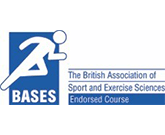
Your Learning Experience
Excellent facilities and learning resources
We adopt an active blended learning approach, meaning you will experience a combination of face-to-face and online learning during your time at LJMU. This enables you to experience a rich and diverse learning experience and engage fully with your studies. Our approach ensures that you can easily access support from your personal tutor, either by meeting them on-campus or via a video call to suit your needs.
Teaching is via a combination of lectures, interactive seminars, one-to-one tutorials, online activities, laboratory-based practical work, online workshops and group work. Guided independent study using our Learning Resource Centres and the web accounts for 70-80% of each module. Web-based content is also available through through our virtual learning environment Canvas (including wikis and blogs for Level 6 modules).
Work-related learning
Every student will have the opportunity to do a sandwich year where you will put into practice the skills and knowledge gained during your studies. We have excellent industry links, including the Football Association, FIFA, various Premier League football clubs and the Professional Footballers' Association.
Dedicated personal tutor, plus study skills support
From day one of the degree programme, you will be allocated a personal tutor and remain under their guidance throughout your time at LJMU. They will be available to discuss any academic or personal issues on a one-to-one basis as well as helping you to put together your educational and future career plans. You will also work with your personal tutor in small groups to develop study skills essential for the science and football programme.
The school is fully committed to promoting a learning environment that supports a culture of equality, diversity and inclusivity (EDI) and has a Disability Support Coordinator, an EDI Coordinator and a School EDI Working Group. Personal Tutors also play a vital role in promoting awareness of support services for students.
Assessment varies depending on the modules you choose, but will usually include a combination of exams and coursework.
We acknowledge that all students perform differently depending on how they are assessed, which is why we use a combination of assessment methods. These include: written assignments (essays and brief response questions), exams (seen and unseen), practical work, portfolios, presentations (group and individual), and reflective practice/diaries.
Your tutors will provide feedback on assessments within three weeks, allowing you to quickly identify your successes and the areas where you may need to put in more work. This is provided via Canvas, face-to-face and/or as written comments for coursework and one-to-one for exams. You are also welcome to arrange further meetings with staff to discuss your feedback.
Where you will study
You will study in Liverpool city centre at our City Campus. Our sport and exercise sciences facilities are world-leading and feature state-of-the-art laboratory facilities for our current and future sport scientists. The Avril Robarts library is within easy walking distance and here you'll find all the information you need to support your studies.
Course tutors
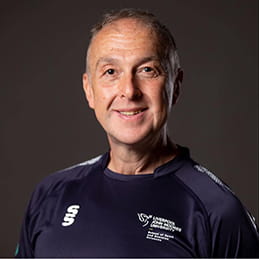
Ian Beattie
Programme Leader
I enjoy seeing each student develop and implementing what they have learned throughout each module into the research project. Across this journey, we can see the students evolve to become independent, critical thinking individuals
I enjoy seeing each student develop and implementing what they have learned throughout each module into the research project. Across this journey, we can see the students evolve to become independent, critical thinking individuals
Ian is a member of LJMU’s Physical Activity Exchange and the Football Exchange within the Research Institute of Sport and Exercise Sciences (RISES). He is also a member of the Green Spaces and the Children, Young People and Families interest groups within the Institute for Health Research. Ian is a Fellow of the Higher Education Academy and studied BA (Hons) Sport Development with Physical Education and MSc Sociology of Sport and Exercise. His research and scholarly activity interests include sport and health policy, sport development processes and their use in the context of health, workplace well-being, figurational sociology in sport and health, work-related learning, e-learning, technology and social media.
-
 L/SL In Physical Activity, Exercise and Health Psychology
L/SL In Physical Activity, Exercise and Health Psychology -
 Lecturer/Senior Lecturer
Lecturer/Senior Lecturer -
 Lecturer/Senior Lecturer
Lecturer/Senior Lecturer -

-
 Lecturer/Senior Lecturer
Lecturer/Senior Lecturer -
 Subject Head
Subject Head -
 Lecturer/Senior Lecturer
Lecturer/Senior Lecturer


Completing the BSc in Science and Football helped me to understand the science and processes within a football and sporting environment, whilst also challenging me to gain the required skills and intellect needed to perform in an elite organisation.
Career paths
A number of our former graduates are now employed in the football industry in the UK, Europe and further afield in sports science support, player development and community programmes.
Our graduates work for a number of elite organisations including - among others - Manchester United Football Club, Liverpool Football Club, Everton Football Club and the Football Association.
Typical roles include performance analysis, sports psychology, fitness and conditioning, education and welfare, and nutritional advice.
Find out more about career opportunities in sport and exercise sciences.
Student Futures - Careers, Employability and Enterprise Service
A wide range of opportunities and support is available to you, within and beyond your course, to ensure our students experience a transformation in their career trajectory. Every undergraduate curriculum includes Future Focus during Level 4, an e-learning resource and workshop designed to help you to develop your talents, passion and purpose.
Every student has access to Careers Zone 24/7, LJMU's suite of online Apps, resources and jobs board via the LJMU Student Futures website.
Tuition fees and funding
- Full-time per year:
- £9,535
- Placement year:
- £1,905
The University reserves the right to increase tuition fees in accordance with any changes to the maximum allowable fees set by the UK Parliament. In the event of such a change, any fee increase will be subject to a maximum cap of 10% of the total course cost as originally stated at the time of your offer.
The fees quoted above cover registration, tuition, supervision, assessment and examinations as well as:
- library membership with access to printed, multimedia and digital resources
- access to programme-appropriate software
- library and student IT support
- free on-campus wifi via eduroam
Additional costs
Although not all of the following are compulsory/relevant, you should keep in mind the costs of:
- accommodation and living expenditure
- books (should you wish to have your own copies)
- printing, photocopying and stationery
- PC/laptop (should you prefer to purchase your own for independent study and online learning activities)
- mobile phone/tablet (to access online services)
- field trips (travel and activity costs)
- placements (travel expenses and living costs)
- student visas (international students only)
- study abroad opportunities (travel costs, accommodation, visas and immunisations)
- academic conferences (travel costs)
- professional-body membership
- graduation (gown hire etc)
Funding
There are many ways to fund study for home and international students. From loans to International Scholarships and subject-specific funding, you'll find all of the information you need on our specialist funding pages.
- Full-time per year:
- £18,250
- Placement year:
- £3,830
International Scholarships and payment plans
Liverpool John Moores University is committed to supporting international students by providing a range of scholarships and flexible payment plans to help students manage their tuition fees.
Scholarships
LJMU provides a variety of scholarships to support international students. Scholarships are available to self-funded students who have accepted their offer and met all the conditions outlined in their offer letter. Students must also demonstrate that they can cover living costs, travel, and other expenses associated to studying at the university. Postgraduate scholarships include tuition fee reductions and are often offered in partnership with external funding organisations.
All self-funded international students are eligible for an automatic scholarship worth up to £4,000. For more details and to view our full list of scholarships, visit the international scholarship webpages.
Deposit
All students must pay a £5,000 deposit before they can receive their CAS letter.
For more information view our deposit page.
Tuition Fee Payment Plan
After paying their £5,000 deposit, students have the option to pay their fees in full or in three equal instalments minus any internal scholarships and discounts. There are two payment options available for international students. You can either pay your tuition fees in full before enrolment or opt for a payment plan. With the payment plan, you can pay your fees in three instalments after making your £5,000 deposit. The first instalment is due before enrolment.
All payments should be made through Flywire. Full details can be found in the How to Pay Guide.
Early Bird Tuition Fee discount
We are excited to introduce a £500 Early Payment Discount to all self-funded international students. Eligible self-funded students who pay their fees by the required deadlines will get a discount which will be automatically deducted from the 1st year of tuition fees.
To see the required deadlines please visit the webpage
A DBS check is not required for your application, however a DBS may be required for modules where there is a work based learning placement option. Work based learning placements that do not require a DBS check are available.
Entry requirements
Please choose your qualifications below to view requirements
Grades/points required from qualifications: CCD-CCC (88-96)
Work out how many UCAS points your qualifications are worth by visiting the UCAS Tariff Calculator.
Qualification requirements
GCSEs and equivalents
Grade 4 or grade C or above in English Language and Mathematics/ Numeracy.
GCSE Equivalences accepted:
• Key Skills Level 2 in English/Maths
• NVQ Level 2 Functional skills in Maths and English Writing and or Reading
• Skills for Life Level 2 in Numeracy/English
• Higher Diploma in Maths/English
• Northern Ireland Essential Skills Level 2 in Communication or Application of Number
• Wales Essential Skills Level 2 in Communication or Application of Number
A levels
CCD-CCC
BTECs
Extended Diploma: MMM (96)
Access awards
Acceptable on its own and combined with other qualifications
Pass overall with a minimum of 88 points.
International Baccalaureate
Acceptable on its own and combined with other qualifications
OCR Cambridge Technical
Extended Diploma: MMM (96)
Irish awards
Acceptable on its own and combined with other qualifications
T levels
Acceptable on its own and combined with other qualifications.
You need to obtain the required UCAS points from a related subject area.
International requirements
IELTS
6.0 overall with no component below 5.5, taken within two years of the course start date.
https://www.ljmu.ac.uk/study/courses/international-entry-requirements
Please Note: All international qualifications are subject to a qualification equivalency check.
How to apply
Securing your place at LJMU
UCAS is the official application route for our full-time undergraduate courses. Further information on the UCAS application process can be found here https://www.ljmu.ac.uk/study/undergraduate-students/how-to-apply.
Your university life
From accommodation and academic support to clubs and societies. Find out what LJMU has to offer.
Related Links
Talk to our students
Connect with a current LJMU student for advice and guidance on university life, courses and more.
See what our students are saying
At LJMU we want you to know you're making the right choice by studying with us. You can see what our students are saying about their experience with us through their reviews on the following websites:
Related Links
News and views
Browse through the latest news and stories from the university
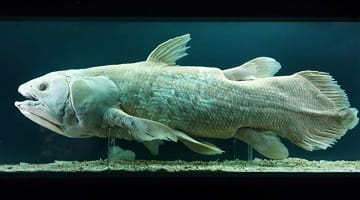

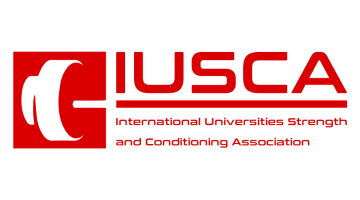
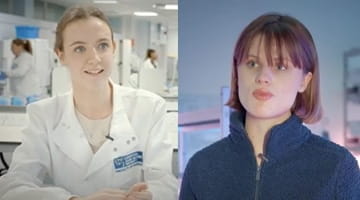
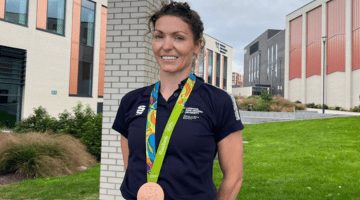
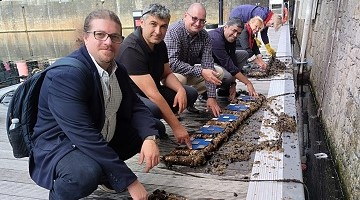

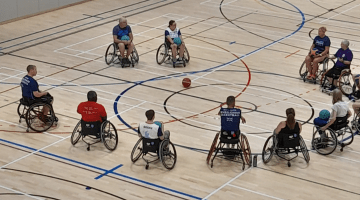
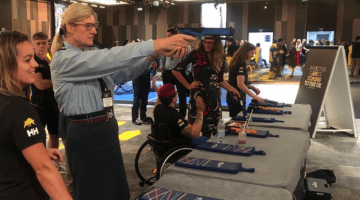
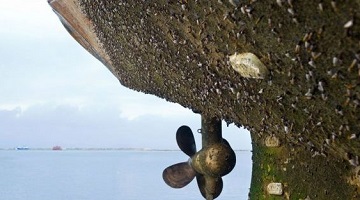
The university reserves the right to withdraw or make alterations to a course and facilities if necessary; this may be because such changes are deemed to be beneficial to students, are minor in nature and unlikely to impact negatively upon students or become necessary due to circumstances beyond the control of the university. Where this does happen, the university operates a policy of consultation, advice and support to all enrolled students affected by the proposed change to their course or module.
Further information on the terms and conditions of any offer made, our admissions policy and the complaints and appeals process.





















